Congratulations to the three co-winners of the 2019 Lasker Essay Contest!
The Lasker Foundation’s annual Essay Contest invites young scientists from around the world to discuss big questions in biomedical research and policy. This year, we asked participants to outline an educational strategy that will increase interest in biomedical sciences among young men and women.
With hundreds of submissions from around the world, the essays of Dereck Paul, Grace Beggs, and Peter John stood out to the judges.
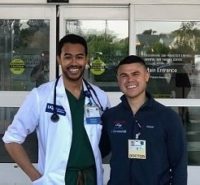
Dereck Paul (left) and UCSF resident Joseph Cleveland at San Francisco General Hospital.
Dereck Paul, a medical student at the University of California, San Francisco, pulled from his own experiences growing up without much exposure to science and medicine. In his essay, “Pathways: A National Mentorship Program for High School Students Underrepresented in Science and Medicine,” he proposed a national mentorship program, following a ‘Big Brothers, Big Sisters’ model, that would match high school students from underserved communities with practicing scientists.
These students can face many obstacles when navigating a career in research, he noted in his essay. For Paul, one of the first challenges was “simply knowing the pathway exists.” A mentorship program “could seed the careers of a generation of new scientists from underrepresented backgrounds and thus enrich the field with a massive influx of diverse ideas and perspectives,” he wrote.
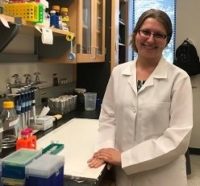 Grace Beggs, a PhD student from Duke University, focused on creating a science-based smartphone application in her essay, “Game On: Smartphone Technology for Science Education.”
Grace Beggs, a PhD student from Duke University, focused on creating a science-based smartphone application in her essay, “Game On: Smartphone Technology for Science Education.”
She suggested an app with an augmented reality function — inspired by the popular smartphone app “Pokémon Go” — so that users could ‘interact’ with the molecular world around them.
“How cool would it be to watch microbes crawl across the sidewalk or hold up your phone to a plant leaf and watch the molecular machinery that makes photosynthesis possible in action?” Beggs said. “That would be a smartphone application that I would definitely want to download!”
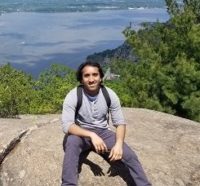 Peter John, an MD-PhD student at the Albert Einstein College of Medicine, also suggested a digital solution to engage young people in science. In his essay, “Making it All Fun and Games in the Biomedical Sciences,” he proposed the creation of a video game that would immerse players into biomedical research.
Peter John, an MD-PhD student at the Albert Einstein College of Medicine, also suggested a digital solution to engage young people in science. In his essay, “Making it All Fun and Games in the Biomedical Sciences,” he proposed the creation of a video game that would immerse players into biomedical research.
“Using electronic media to convey educational information is not an entirely new strategy, but it has generally been a niche approach and so has been underutilized,” John said. “I think that electronic media has promise as not merely a teaching tool, but also as something that can spark interest and excitement for the sciences in the next generation.”
As the three co-winners of the essay contest, Paul, Beggs, and John will each receive $10,000 toward their educational expenses. They are also invited to attend this year’s Lasker Awards Luncheon in September.
“Meeting the Lasker Laureates in New York this year will be a once-in-a-lifetime opportunity,” Paul said. The winners also noted how the prize motivates them to continue sharing their ideas about issues in both science and medicine.
“This prize has already helped boost my confidence in my ability to communicate an original idea of my own,” said Beggs. “[It] gives me encouragement that my ideas are worth writing down and that a receptive audience exists among the scientific community,” added John.
Grace Beggs, Duke University School of Medicine
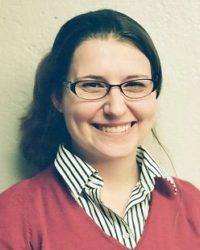 Grace Beggs is a PhD candidate in the Department of Biochemistry at Duke University School of Medicine. Her dissertation research in Richard Brennan’s lab focuses on structurally and functionally characterizing multidrug binding proteins that play a role in antibiotic resistance in Neisseria gonorrhoeae and Escherichia coli. Curiosity drives Grace to elucidate the molecular mechanisms of antibiotic resistance and stress responses in these pathogenic bacteria. Outside of the lab, Grace enjoys cooking and traveling.
Grace Beggs is a PhD candidate in the Department of Biochemistry at Duke University School of Medicine. Her dissertation research in Richard Brennan’s lab focuses on structurally and functionally characterizing multidrug binding proteins that play a role in antibiotic resistance in Neisseria gonorrhoeae and Escherichia coli. Curiosity drives Grace to elucidate the molecular mechanisms of antibiotic resistance and stress responses in these pathogenic bacteria. Outside of the lab, Grace enjoys cooking and traveling.
Essay Game On: Smartphone Technology for Science Education
Peter John, Albert Einstein College of Medicine
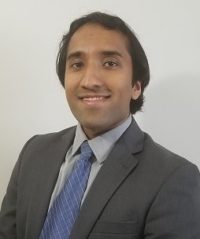 Peter John is a 6th year MD-PhD student at Albert Einstein College of Medicine. Immigrating to the US from Kuwait at the age of 12, he subsequently grew up in Queens, NY. Peter is now completing his thesis research in Xingxing Zang’s laboratory. His work centers on cancer immunology, studying how tumors evade the immune system and exploring how to use immunotherapy to treat cancer. In the future, Peter intends to become a physician-scientist, practicing clinical oncology and performing research to advance cancer treatment. Outside of work, he enjoys hiking, running, and strength training and is an avid enthusiast of video and board games.
Peter John is a 6th year MD-PhD student at Albert Einstein College of Medicine. Immigrating to the US from Kuwait at the age of 12, he subsequently grew up in Queens, NY. Peter is now completing his thesis research in Xingxing Zang’s laboratory. His work centers on cancer immunology, studying how tumors evade the immune system and exploring how to use immunotherapy to treat cancer. In the future, Peter intends to become a physician-scientist, practicing clinical oncology and performing research to advance cancer treatment. Outside of work, he enjoys hiking, running, and strength training and is an avid enthusiast of video and board games.
Essay Making it All Fun and Games in the Biomedical Sciences
Dereck Paul, University of California – San Francisco
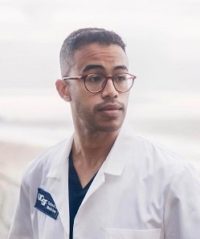 Dereck W. Paul Jr. is an MD candidate at University of California, San Francisco (UCSF) School of Medicine. He was born in Queens, New York to parents who immigrated to the United States from Guyana and Trinidad. He is completing clinical clerkships in a program focused on the care of the underserved at San Francisco General Hospital and intends to pursue a residency in internal medicine. Through his writing and speaking, he advocates for physician activism on issues traditionally thought to be outside the purview of medicine, including firearm violence, police violence, and immigration policy.
Dereck W. Paul Jr. is an MD candidate at University of California, San Francisco (UCSF) School of Medicine. He was born in Queens, New York to parents who immigrated to the United States from Guyana and Trinidad. He is completing clinical clerkships in a program focused on the care of the underserved at San Francisco General Hospital and intends to pursue a residency in internal medicine. Through his writing and speaking, he advocates for physician activism on issues traditionally thought to be outside the purview of medicine, including firearm violence, police violence, and immigration policy.
